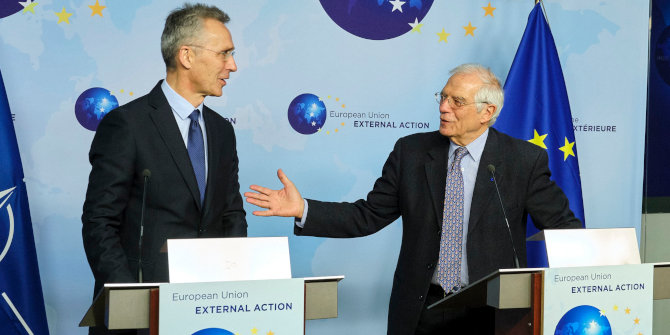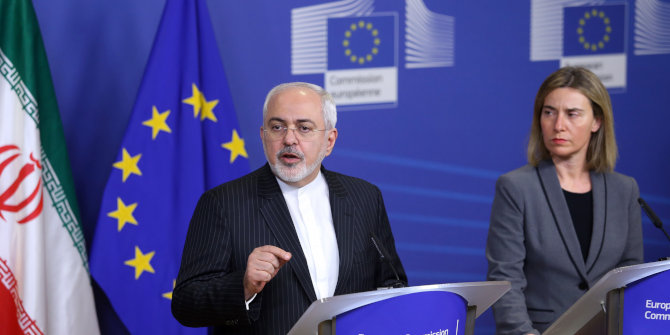 The Covid-19 outbreak has put many of the EU’s foreign policy objectives on hold. However, as Julia Strasheim writes, the pandemic is not the only obstacle to boosting the European Union’s role as a global peacebuilding power. The bigger structural hurdle is democratic decline within its own borders, and the implications this has for the EU’s credibility abroad.
The Covid-19 outbreak has put many of the EU’s foreign policy objectives on hold. However, as Julia Strasheim writes, the pandemic is not the only obstacle to boosting the European Union’s role as a global peacebuilding power. The bigger structural hurdle is democratic decline within its own borders, and the implications this has for the EU’s credibility abroad.
Before the coronavirus outbreak forced the EU into an exceptional public health and economic crisis, experts hoped that the upcoming German EU Council presidency and ongoing negotiations for the 2021-27 multiannual financial framework could provide an opportunity to boost the EU’s role as a peacebuilder and make promoting peace an EU foreign policy priority.
But even though Angela Merkel stressed in her May 2020 speech on foreign policy goals during the German presidency that she would like the EU to take on more responsibility for “peace and security in the world”, expectations are that the pandemic will force the union to look inward and downsize ambitions for a more influential global role.
But the pandemic does not mean that other challenges will go away, and it will likely exacerbate existing humanitarian crises and conflicts. Furthermore, the bigger structural, long-term obstacle to the EU advancing its peacebuilding agenda is not Covid-19, but democratic decline within its borders and unwillingness among political leaders to more forcefully condemn it.
This is because the EU remains “trapped in the liberal peace”. It has made promoting democracy in post-conflict societies the heart of its peacebuilding identity and strategy. Failing to defend democracy in Europe, most recently in Poland and Hungary, means the EU is putting its credibility as a peacebuilder abroad on the line – with potentially harmful consequences.
The EU’s evolving peacebuilding toolbox
The EU has carefully crafted an image of itself as a community of values, founded on respect for democracy, the rule of law, and human rights. These values are enshrined in treaties and institutions, play a crucial role in the everyday life of citizens, and are guiding principles of numerous foreign policy frameworks, such as the EU’s neighbourhood or accession policies.
Promoting democracy has also long been a crucial element in the EU’s toolbox for ending conflict and fostering peace. Via various peacebuilding instruments, such as its Instrument contributing to Stability and Peace, the EU has assisted countries in enhancing their electoral integrity (such as in Afghanistan), reforming security sectors (the Sahel), promoting the rule of law (Kosovo), or empowering civil society (Ukraine).

NATO Secretary General Jens Stoltenberg and the High Representative for Foreign Affairs and Security of the European Union, Josep Borrell, Credit: NATO (CC BY-NC-ND 2.0)
The EU has thus largely followed what political scientists call the “liberal peacebuilding model” – the dominant peacebuilding agenda among western actors in the post-Cold War era. The logic behind a peace-through-democracy approach is simple: if armed conflicts are fought over controlling a government or improving minority rights, then building democracies after civil war transforms the means of conflict “from the bullet to the ballot box”.
But liberal peacebuilding is under fire. Policymakers and academics alike think it is outdated, as a changing world order and widespread disillusionment with overly ambitious peacebuilding endeavours in the 1990s and early 2000s have pushed international actors, in discourse and practice, towards embracing stabilisation and counterterrorism. The EU in particular has shifted its narrative from peacebuilding to “resilience” – stressing stability, security, and order over transformative ambitions for political change.
Displacement crises in its neighbourhood have also pushed the EU toward humanitarian rather than democracy support – or even toward inaction, making it a liberal peacemaker “in theory” only. And even before recent developments, liberal peacebuilding was under fierce criticism as scholars emphasised how the policy privileges one-size-fits-all programmes for peace that are based on western experiences and templates.
Having said that, key EU foreign policy doctrines, such as the 2016 Global Strategy, still promise to support “inclusive governance” in conflict societies. Germany’s 2017 guidelines on resolving conflicts and building peace likewise accentuate that the “core principles of the free and democratic order in Germany” carry its peacebuilding activities. Rhetorically, most stabilisation missions today take place behind a facade of liberal values. Some policies now associated with the stabilisation paradigm have long been integral to liberal peacebuilding, such as security sector reform; and think tanks continue to recommend other liberal policies to EU peacemakers, such as electoral support. Generally speaking, it is exceptionally hard to change the course and aims of peacebuilding endeavours that have been going on for many years, such as in Afghanistan.
Practice what you preach
So besides a changing world order and shifting international discourse on peacebuilding, the biggest obstacle to boosting the EU’s role as a global peacebuilder is democratic decline within its borders. This is because the EU can only be an effective peacebuilder if it is also a credible one in the eyes of those on the receiving end of its policies – and this credibility is now at stake.
Peacebuilder credibility derives from many sources: established expertise, a good track record, or commitment to local ownership. But research also tells us it is just as vital that local populations perceive peacebuilders as role models for the policies they implement: they should practice what they preach. Politicians in Nepal, who I interviewed for my research on security sector reform, for instance, liked to point out that European donors want them to increase female representation in its security sector, but the officials proposing such changes were exclusively men.
Democracy has been retreating in the EU – and the world – for a while now. Already before the pandemic, Hungary had been the first non-democratic EU member state according to the Varieties of Democracy project. In Poland, the ruling Law and Justice Party (PiS) has for years been curtailing judiciary independence, media freedom, and women’s rights.
But Hungarian prime minister Viktor Orbán’s power grab in March 2020 that allowed him to suspend existing laws and rule by decree, and PiS’ efforts in May 2020 to enforce a presidential election amidst a global pandemic, have revived interest in democratic decline in the EU. Journalists have rightfully called reactions by EU leaders and institutions to these events powerless, wishy-washy, toothless, or even complicit.
To be sure: this is not the first time the EU’s credibility as a peacebuilder has been damaged. The 2015 refugee crisis exposed double standards between its democracy agenda and other interests; and internal divisions that prohibited better external action have damaged its credibility in Libya.
But research shows that yet another credibility crisis could potentially have harmful consequences for the EU’s peacebuilding agenda. When peacebuilders lose credibility, local partners in post-conflict societies may become suspicious of proposed policies and uncompliant in their implementation. At worst, resentment against international efforts can result in a backlash or even new violence, as happened in Kosovo. In the long run, Europe’s credibility crisis may help empower peacebuilders uncommitted to the promotion of human rights or the rule of law, such as China.
Even if Hungary’s emergency laws were only temporary, EU leaders’ reluctance to more forcefully condemn this attack on democracy and develop clear and functioning mechanisms to confront it may permanently call into question the consolidation of EU democracies. This jeopardises the EU’s credibility abroad and thus devalues its most powerful currency as a peacebuilder – at a time when, amidst waning US commitment to peacebuilding, a more ambitious role for the EU in this area is more important than ever.
Please read our comments policy before commenting.
Note: This article gives the views of the author, not the position of EUROPP – European Politics and Policy or the London School of Economics.
_________________________________
 Julia Strasheim – Bundeskanzler-Helmut-Schmidt-Stiftung
Julia Strasheim – Bundeskanzler-Helmut-Schmidt-Stiftung
Julia Strasheim is Deputy Managing Director and Program Director for European and International Politics at the Bundeskanzler-Helmut-Schmidt-Stiftung in Hamburg, Germany, Research Associate at the GIGA German Institute of Global and Area Studies, and Visiting Lecturer at the University of Heidelberg. She tweets @juliastrasheim



